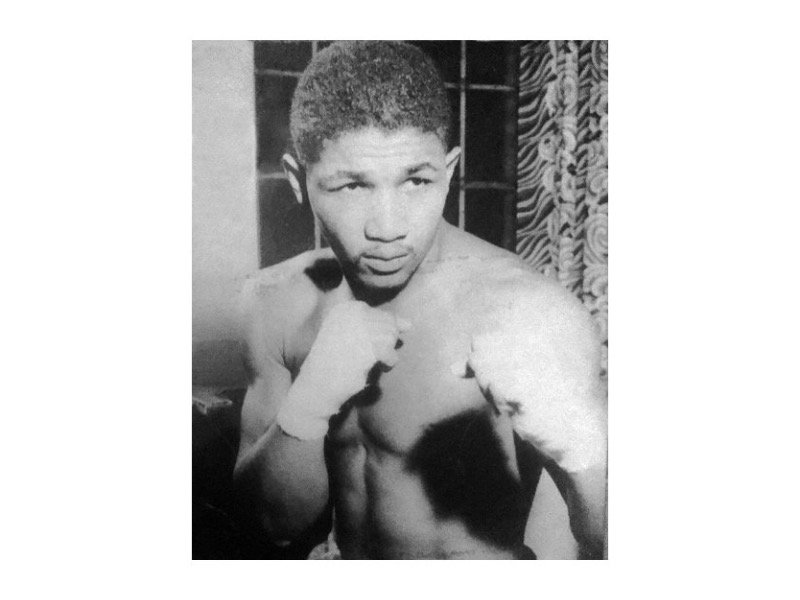Pugilism has had a sort of revival in Milwaukee, though why a man who can bruise another with skill should be hailed with enthusiasm is not clear. Any healthy mule can use his heels with more skill and effect than the best of the professional bruisers. If there must be a belt for this sort of thing, give the mule a show. – Milwaukee Sentinel, June 14, 1882
On April 28, 1888, streets were mobbed with people intent on witnessing a crime they’d looked forward to for three years. They ended up seeing two: an illegal prizefight and the underhanded plot that stole victory from the apparent winner and left him blubbering like a baby.
Some background: shortly after the above editorial appeared in the Sentinel, "Professor" John Donaldson, a well-known heavyweight boxer, opened a boxing school at his saloon on Grand (now Wisconsin) Avenuee between 2nd and 3rd Streets.
Prizefighting had been illegal in Wisconsin since 1869, but the subsequent advent of the Marquis of Queensbury rules outlawing biting, kicking, gouging and other mulish tactics in the ring, and calling for combatants to wear gloves instead of going bare-knuckled, had softened opposition to boxing.
When Jack "Gypsy" Ward, one of Prof. Donaldson’s protégés, knocked out John Brooks in three rounds on Aug. 5, 1882, among the 1,200 spectators at Milwaukee Driving Park (between 27th and 36th Streets, and State Street and Juneau Avenue) were "several city officials and citizens who pride themselves on their respectability," noted the Sentinel.
Asked beforehand if he would countenance the illegal bout, Mayor John Stowell blithely answered, "When I come to the announcement of a prizefight, I skip to some other part of the newspaper."
Not all officialdom was so blasé, however.
"I regard all such sports as brutal," said Sheriff John Rugee, who favored arresting not only everyone who put on boxing gloves but also any merchants who sold them. "And it would be a benefit to the community at large if the participants would pummel each other out of existence. "
Rugee’s and the opposition of other authorities and church leaders eventually drove boxing back underground.
Bouts were held in private, word of their location passed from mouth to mouth to prevent official interference.
Gypsy Ward, Milwaukee’s new champion, was a hard-drinking roughneck who loved to brawl in and out of the ring. In a street fight against two men, he’d reportedly flattened one and then picked up his body and used it like a club to fracture the other guy’s skull.
Nobody had the temerity to challenge him for almost three years. The upstart who did then was Patrick D. "Patsy" McCartin, 22-year-old employee of the Bay View Rolling Mill and owner of a saloon on Kinnickinnic Avenue.
He’d never fought before, but friends convinced him he could take Ward in a fight to the finish.
"Not in my city," declared Mayor Emil Wallber, who’d succeeded John Stowell the year before.
But it happened anyway at Rose Hill Park, where South Muskego and West Forest Home Avenues intersect. Just after two o’clock in the morning on Feb. 8, 1885, McCartin and Ward, wearing three-ounce gloves, entered a 24-foot ring surrounded by several hundred paying customers that included, to the discerning eye of the Sentinel’s man on the scene, "a number of well known dog-fighters, chicken-fighters, aldermen and other sporting characters."
They witnessed an epic battle that lasted one hour and 43 minutes. Though outweighed 175 to 157 ½ pounds, McCartin used speed and superior ring craft to score a knockout in the 27th round.
Ward demanded a rematch, but McCartin refused.
"I have no ambition to be a prizefighter," he said, "and will never figure in (a fight) again."
Then he joined the Milwaukee police force.
But a year later McCartin resigned and opened a downtown saloon where he set up a ring in a back room and conducted bouts advertised as "sparring contests" to circumvent police interference.
What local boxing enthusiasts called "The Fancy" kept demanding to see was a rematch between McCartin and Ward, and after a three-year holdout McCartin finally agreed to it in early March 1888. He and Ward went into intensive training for what the Sentinel said "promises to be one of the greatest ring contests that has taken place in the Northwest in the last few years."
At one o’clock on the afternoon of April 28 – "A great day for sports," according to the front page headline of The Evening Wisconsin newspaper – a special train, 10 cars long, left the station at North 3rd and West Vliet Sreets.
Aboard were the two fighters and their handlers, the 500 fans who’d milled around downtown all morning to find out where the fight would be held and paid $4 apiece for a ticket, and lumber and tools with which to construct a 24-foot ring when the train reached its destination.
A posse led by the Ozaukee County Sheriff descended on Saukville to prevent the fight but found nothing going on there because the train stopped and the ring was set up in a wooded glen near Thiensville instead.
The contract called for a "mutually agreed upon" referee, but after debating the matter for an hour with no agreement it was decided that each fighter would have his own "umpire," and at four o’clock McCartin and Ward finally put up their nominally padded (two ounce gloves, the equivalent of winter mittens) dukes.
This one was a whole different kind of classic.
When the fighters clinched in the first round their respective umpires clambered into the ring to pull them apart. Billy Sisson, McCartin’s umpire, did it too roughly to suit Ward, who punched him in the face.
When the next round started, reported the Sentinel, "…Sisson sprang towards Ward, first kicking him with as much force as possible and then, jumping on his back, began to pound him as furiously as possible."
Ward’s seconds grabbed Sisson and hustled him away from the ring.
McCartin knocked Ward down in the second round and bloodied him up. In the fifth round he floored his bigger opponent twice and seemed to have won by a knockout when Ward’s umpire, Jack Bolenback announced, "I give this fight to Ward on a foul."
Then, instead of explaining the verdict he had no official standing to render, Bolenback jumped into a carriage and beat it back to town.
The Daily Reporter, a Milwaukee newspaper, had warned the day before that "in certain circles it is said that the fight will be stopped or declared a draw in case Ward appears to be getting the worst of (it)."
While McCartin and his followers were outraged and protested the decision, "there was nothing for them to do but to swallow their indignation and return home," said the Sentinel.
But first, Patsy "wept like a child and it was fully half an hour before he would in any way be consoled."
What else was he going to do – look for a cop?







